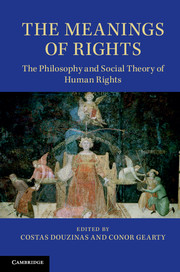Book contents
- Frontmatter
- Contents
- Notes on contributors
- Introduction
- Part I Finding foundations
- Part II Law, rights and revolution
- Part III Rights, justice, politics
- Part IV Rights and power
- 12 Second-generation rights as biopolitical rights
- 13 History, normativity, and rights
- 14 “All of us without exception”: Sartre, Rancière, and the cause of the Other
- 15 However incompletely, human
- 16 Welcome to the “spiritual kingdom of animals”
- Index
- References
16 - Welcome to the “spiritual kingdom of animals”
Published online by Cambridge University Press: 05 June 2014
- Frontmatter
- Contents
- Notes on contributors
- Introduction
- Part I Finding foundations
- Part II Law, rights and revolution
- Part III Rights, justice, politics
- Part IV Rights and power
- 12 Second-generation rights as biopolitical rights
- 13 History, normativity, and rights
- 14 “All of us without exception”: Sartre, Rancière, and the cause of the Other
- 15 However incompletely, human
- 16 Welcome to the “spiritual kingdom of animals”
- Index
- References
Summary
The German expression rückgängig machen, usually translated as “annul, cancel, unhitch,” has a second more precise meaning: to undo something retroactively, to make it as if it had not taken place. The comparison between Mozart’s Figaro and Rossini’s Figaro operas makes this action immediately clear. In Mozart, the emancipatory political potential of Beaumarchais’ play survives the pressure of censorship – think only of the finale, where the Count has to kneel down and ask for forgiveness before his subjects (not to mention the explosion of the collective “Viva la liberta!” in the finale of Act 1 of Don Giovanni). The breathtaking achievement of Rossini’s Barber should be measured by this standard. Rossini took a theatrical symbol of the French bourgeois revolutionary spirit, and totally de-politicized it, changing it into a pure opera buffa. No wonder the golden years of Rossini were between 1815 and 1830. These were the years of reaction when the European powers tackled the impossible task of the Ungeschehenmachen (making-it-not-happen) of the previous revolutionary decades. This is what Rossini did in his great comic operas: he tried to bring back to life the innocence of the pre-revolutionary world. Rossini did not actively hate or fight the new world. He simply composed as if the years 1789–1815 did not exist. Rossini was therefore right to (almost) stop composing after 1830 and to adopt the satisfied stance of a bon vivant making his tournedos – this was the only properly ethical thing to do. His long silence is comparable to that of Jean Sibelius and, in literature, to Arthur Rimbaud and Dashiell Hammett.
- Type
- Chapter
- Information
- The Meanings of RightsThe Philosophy and Social Theory of Human Rights, pp. 298 - 318Publisher: Cambridge University PressPrint publication year: 2014



